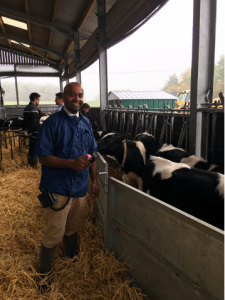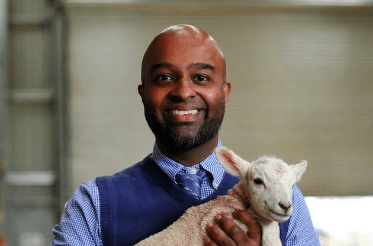Farm vet Partheeban Navaratna explains the challenges faced by people of colour working in agriculture, and the value diversity can bring.
As well as a vet, Theeb is a Royal Agricultural University lecturer and founder of the British Veterinary Ethnicity and Diversity Society – BVEDS.
He writes:
During my summer holidays, since the age of 7, I would spend time with my uncle who was a vet working in East London. To begin with, the fun was playing with the inpatients and having McDonalds for lunch but soon I started to wonder what he was talking about in the consult room or doing in surgery.
This interest grew and I was soon sitting in all day with him watching, listening and learning. When I finally decided I wanted to be a vet, I went to work on beef and dairy farms to gain experience.
Not coming from a farming background, this was a new experience but something I really enjoyed. The farmers, in most cases, were really keen to get me involved with the day to day work they had to do.
Once in university, I started to gain a passion for the farm animal side of veterinary work and was something I was keen to pursue. One big doubt in my mind was if I could ever be a farm vet due to my lack of an agricultural background.
In my finals, after completing an equine exam, one of my professors asked me what I would be doing after qualification. I said that farm was my interest but that I had no chance due to my background. He turned around and said that he is currently one of the top equine vets in the country with half his time spent in the UAE but he had never sat on a horse until he was 19.
His words “you can do anything you put your mind to” had never rung so true to me and he was my inspiration for everything I have done ever since.
I have worked in veterinary practice, industry and academia within agriculture. Talking about and working with cattle and sheep has been a dream come through.
Farmers’ reactions
Most farmers have been very supportive and I truly am passionate about this industry. Some of the best experiences I have had are working with farmers for a common goal such as reducing disease on farm, teaching farmers new skills, learning about the farmer’s experiences and being made to feel like part of the farmer’s family.

However there have been some experiences which have been difficult to deal with such as a farmer not wanting me on their farm based on my skin colour, a Farmers Weekly reader writing to me to tell me that I am not British, some qualified vets justifying the use of racial slurs and being treated as a foreigner.
At first this is difficult to take and being an ethnic minority, one feels isolated in these situations. What I did was to seek help and reassurance. I rang helplines and spoke to other people who may have suffered similar problems. It is difficult to find other BME people in agriculture but is something I am trying to help improve.
Due to my passion for agriculture and veterinary medicine, I want these to be open for others to experience. I am trying to help make these industries more inclusive. Businesses perform and thrive with a diverse workforce. We need this in agriculture.
A colleague and I set-up the British Veterinary Ethnicity and Diversity Society (BVEDS) 3 years ago, which has really helped to start the conversation and get the process for change started. We support those wanting to or currently working in the veterinary profession with issues of race, ethnicity, diversity and discrimination. In agriculture, this change needs to happen.
The big restrictions on getting a wider spectrum of people into farming are the lack of role models, financial restrictions and the lack of access to experience. These all need to be tackled to help our industry thrive.
To make British agriculture something we are proud of, we all need to be part of it.

